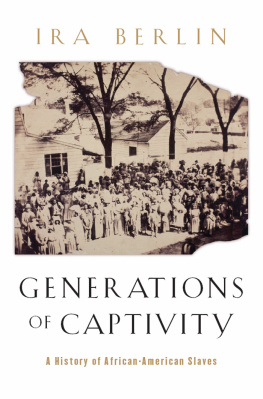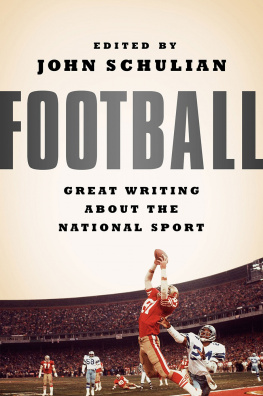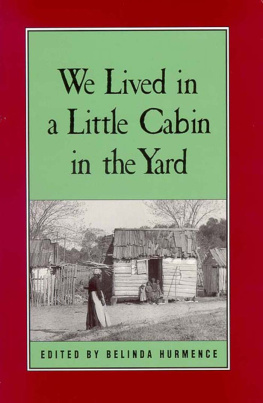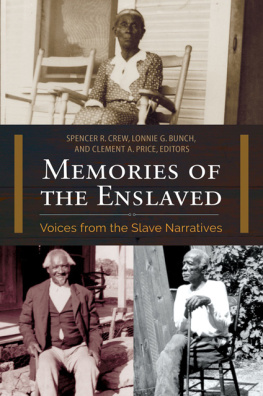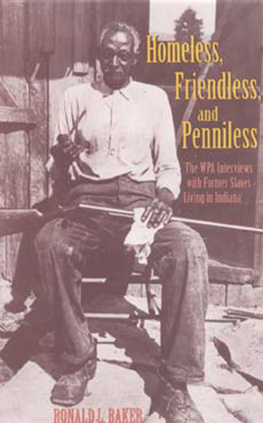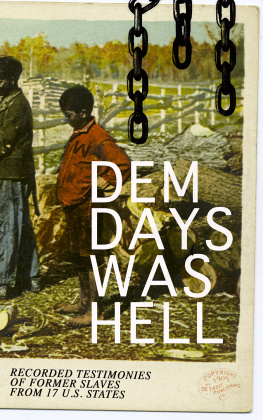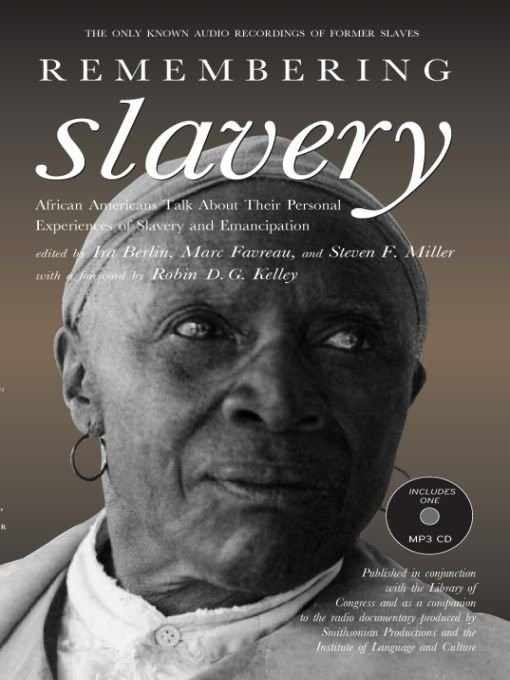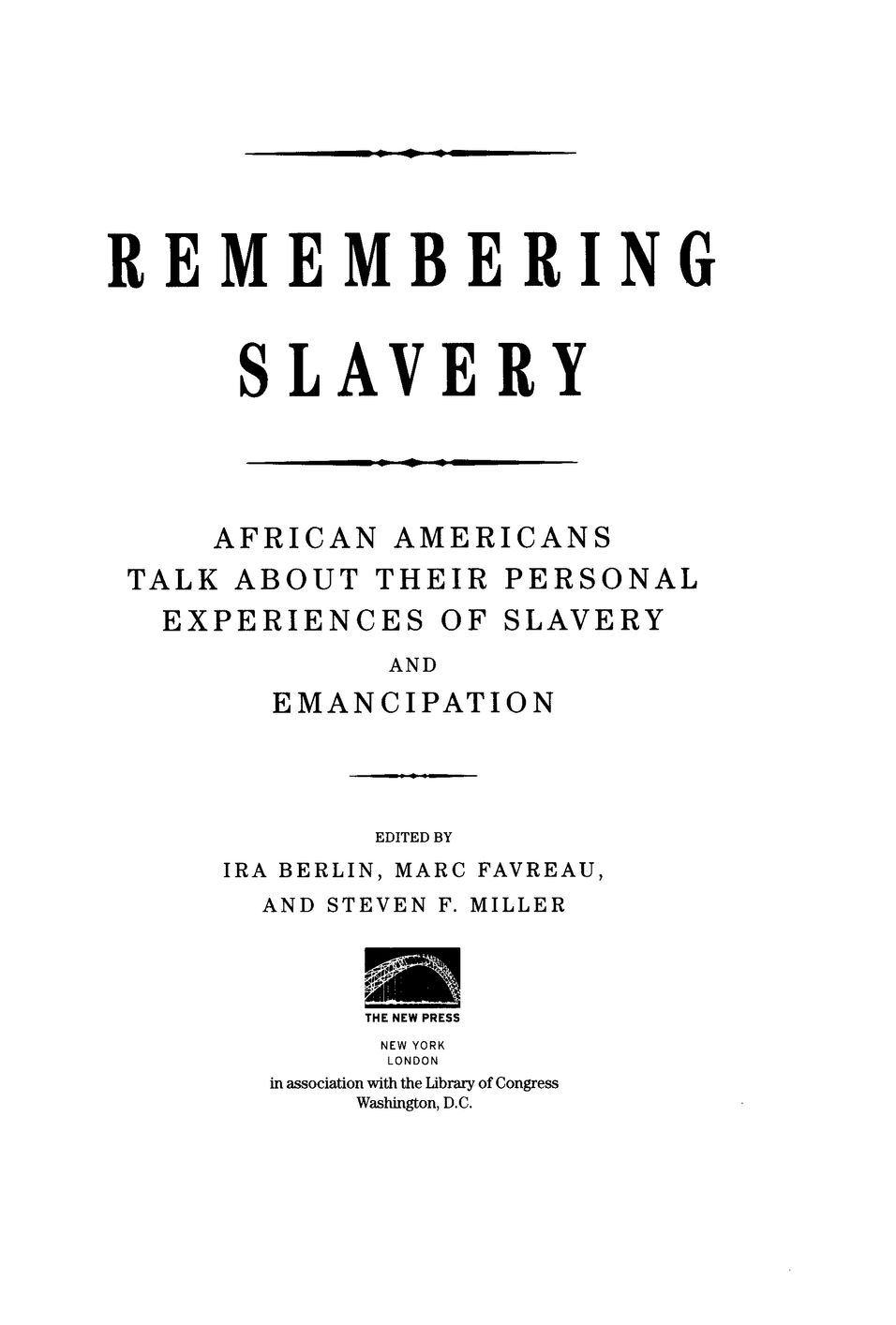Table of Contents
Also available from The New Press
Families and Freedom:
A Documentary History of African-American Kinship
in the Civil War Era
Edited by Ira Berlin and Leslie S. Rowland
Free at Last:
A Documentary History of Slavery, Freedom, and the Civil War
Edited by Ira Berlin, Barbara J. Fields, Steven F Miller,
Joseph P. Reidy, and Leslie S. Rowland
Prophets of Protest:
Reconsidering the History of American Abolitionism
Edited by Timothy Patrick McCarthy and John Stauffer
Remembering Jim Crow:
African Americans Tell About Life in the Segregated South
Edited by William H. Chafe, Raymond Gavins, and Robert Korstad
Slavery and Public History:
The Tough Stuff of American Memory
Edited by James Oliver Horton and Lois E. Horton
Slavery in New York
Edited by Ira Berlin and Leslie S. Harris
Slaves Without Masters:
The Free Negro in the Antebellum South
by Ira Berlin
FOREWORD
Racial slavery has shaped virtually every aspect of our nations history. Slavery provided one of the essential legs upon which modern capitalism was built. Slavery shaped the development of the American political structure, from its peculiar form of federalism to the astonishing, and continuing, disproportional influence of Southern legislators. Todays various racial constructionswhiteness, blackness, and an Other category that persistently renders nonwhites and nonblacks invisibleare obviously rooted in the history of slavery and Jim Crow.
Enslaved Africans and their descendants were and are assigned the impossible role of maintaining stable American race relations. Slaves were instructed on pain of injury not to protest an unhealthy relationship fixed by whites for the benefit of whites. Remarkably, slaves did not obey. They managed to bring on the Civil War; in the process, they destroyed the system of slavery and delivered a more fully realized American democracy.
Those heroic people are the generation most represented in this important book-and-CD set. Daughters and sons of Africa, these children who bore the mark of the lash wanted free universal education for everyone, the right to vote for everyone, the right to own and work their land, the right to build communities, worship, and love each other without the threat of mob violence. The architects of a new nation... these are the people the Federal Writers Project and others sought to restore to history during the 1930s and early 1940s. And these are the souls Ira Berlin, Marc Favreau, and Steven F. Miller want us to remember.
Those ex-slaves who lived to tell their stories do not all speak in one voice, nor do they share one big collective memory. The interviews do represent one of the few bodies of slave thought in which black slaves described the conditions they faced, their oppressions, their resistance. But some of the passages will frustrate readers interested only in dramatic cases of brutality or heroic acts of defiance. Alongside the tragic we find stories of happy darkies who virtually pine for the days of slavery, as well as detailed, moving descriptions of the day-to-day violence inflicted on the very young and very old.
Stories like the latter were told at considerable risk. As Wes Brady put it in his interview, Some white folks might want to put me back in slavery if I tells how we was used in slavery time, but you asks me for the truth. Readers must remember that when these interviews were being conducted, the stench of strange fruit still lingered in the Southern countryside where many of the informants still resided. In 1935 alone there were fifteen recorded lynchings, for which no one was prosecuted. Prisons and jails were populated with African Americans whose only crime was insolence, the most infamous case involving nine young men falsely accused of raping two white women near Scotts-boro, Alabama.
The ex-slaves had reason to be scared. Readers must also keep in mind that what the elderly informants remembered about the old times was being filtered through their present struggle to endure the Great Depression. They spoke with their heads and their stomachs. We was happy, recalled Felix Haywood. We got our lickings, but just the same we get our fill of biscuits every time the white folks had em. Nobody knew how it was to lack food.
But fear and Depression hunger alone do not explain the complicated character of their recollections. Slavery was a painful period, an era African Americans had been trying to forget since Reconstruction. Consider that many black churches worked hard to eliminate the ol spirituals as a way of removing all vestiges of slavery from their cultural memory. The worst of the informants slavery experiences may have been purged from their minds.
In any case, the moments of pleasure and happiness that the ex-slaves did remember never celebrate the master class or endorse the system of slavery. Even as slaves, black people struggled to own their own lives; they turned the quarters and yards and woods into places of quiet contemplation or hideaway dens for party people. Later they recalled those good times and even expressed sympathy and kindness for their keepers. How could they not? How on earth could so many people held in bondage have survived slavery without humor, joy, love, good times, healthy relationships, a sense of self-worth?
If all of these disparate stories and diverse voices embody one single theme, it is humanity. Together the narratives reinforce the incredible ability of African Americans to maintain their dignity and self-worth, to offer the rest of the world a model of humanity that could emancipate free people the world over, including their own masters, the overseers, and even the paddy rollers dispatched to hunt down runaways. The smartest slaveholders must have come to appreciate black humanity and its capacity for love and forgivenessfor those qualities are precisely what spared the lives of the masters and their families. It is our recognition of the ex-slaves humanity that enables us to discard the false dichotomies of Sambo and rebel and see these amazing black survivors as complicated human beings.
Robin D. G. Kelley
PREFACE
Remembering Slavery is a short book with a long history. First among its many progenitors is Andr Schiffrin, publisher of The New Press. In 1995, Schiffrin and Ralph Eubanks, director of publications at the Library of Congress, initiated a project to make available a book-and-tapes version of the audio recordings of former slaves dating from the late 1930s and 1940s. A year later, Schiffrin invited Ira Berlin of the University of Maryland to lead the project; Berlin in turn enlisted Marc Favreau, then beginning graduate studies at the university, to join him. Together they began the laborious process of transcribing and annotating the tapes at the Library of Congress, which had been copied from the primitive aluminum disks that had originally stored the former slaves reminiscences. In this work they found indispensable the extraordinarily detailed transcriptions crafted by linguists Guy Bailey, Natalie Maynor, and Patricia Cukor-Avila. Professor Bailey, now a dean at the University of Texas, San Antonio, generously granted permission to use these transcriptions and offered his own expertise in interpreting him. For that we would like to thank him.


